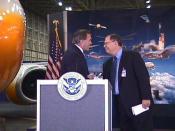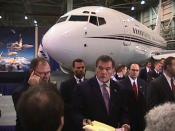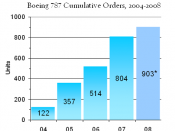Module 1 Case Study: An Affair to ForgetÃÂ ETH301September 1, 2008An Affair to ForgetÃÂ Harry Stonecipher, president of Boeing Aircraft should have been forced to resign after he admitted to his adulterous affair with a fellow executive of the company. Stonecipher violated the very code of conduct he so stringently enforced with his employees. He did not tolerate the smallest infraction and fought hard to restore BoeingÃÂs tarnished reputation and sought to inject a new set of ethical standards at the company. Stonecipher, who came back to the company after a 15-month retirement, took the reins of a troubled company that had already been plagued by poor business practices and procurement scandals. He helped the Boeing Company develop compliance programs that promoted its commitment to integrity and values and even set them forth in a structured and detailed contractual Code of Conduct that dictated employee behavior. All employees were asked to review these policies and by their signature agreed to abide by and comply with proper business conduct in the workplace.
Harry Stonecipher, the standard bearer for the company, had now through his own bad judgment made a mockery of the values he had tried so hard to instill and impart to his own employees.
Boeing Board Chairman, Lewis Platt, noted that, ÃÂHe (Stonecipher) drew a very bright line for all employees, and when one does that, you have to live by that standardÃÂ (Chandler, 2005). Harry Stonecipher set the standards high in his company and set himself up for the course of destruction he would embark on. The Code of Conduct carefully spelled out the conduct of its employees and left little to misinterpret:In the course of conducting company business, integrity must underlie all company relationships; including those with customers, suppliers, and communities and among employees...employees must not engage in conduct or activity that may raise questions as to the companyÃÂs honesty, impartiality, or reputation or otherwise cause embarrassment to the company. ÃÂ . They do not engage in any activity that might create a conflict of interest for the company or for themselves individually. (Boeing Code of Conduct, 1/26/2004)Did President and CEO Harry Stonecipher violate this strict and enforceable code by his consensual affair with a fellow employee? On March 7, 2005, the Board of Directors said yes and made the decision that he did indeed violate that code and asked for his resignation. The Board determined that his actions were inconsistent with the BoeingÃÂs Code of Conduct. The board felt the CEO must set the standard and demonstrate unimpeachable professional and personal behavior. (Canning, 2005)Harry Stonecipher exercised extremely bad business as well as personal judgment when he involved himself with a relationship with a fellow employee. He made a moral choice based on his own desires and needs, without regard to those who would suffer as a result of his actions. A core tenet of utilitarianism is that everyoneÃÂs interests should be considered equally when making decisions. When Stonecipher made his decision, he did not consider the consequences or who it would harm. Did his actions benefit anyone other than himself? The ethical decision he made did not benefit his wife, the potentially scarred reputation of a fellow employee, and the many employees who looked to their leadership for guidance and professional examples of proper business conduct. When you consider the utilitarian viewpoint, Harry Stonecipher, when faced with an ethical choice, did not take the path that would generate good or have some positive long-term effect on anyone other than himself. Utilitarianism holds that in any given situation the ÃÂrightÃÂ act is that which produced the greatest good, while all other acts are wrong. He became an ethical egotist, the only consequence of his actions considered were those of his own immediate pleasure. Were the real consequences of his actions and the welfare of others ever a consideration? If we look at the most obvious results of his actions we see a company beset now by more controversy and scandal and a sense of eroded confidence in a leader that was supposed to be their example for morality and integrity. We can also only imagine the embarrassment and humiliation and personal pain his wife endured while her husbandÃÂs exploits were smeared across every form of media. In addition, one must consider the aftermath of the scandal that this brought to the ÃÂotherÃÂ woman involved as well. Her reputation and her own lapse in judgment were brought to bear in front of the entire company. She was also made a party to violation of the companyÃÂs Code of Conduct.
Conversely, even though Harry Stonecipher did not make a moral decision based on the consequences of his actions, I applied the viewpoint of utilitarianism to decide that he should have been forced to resign his position for Boeing. The decision to resign would serve the greater good within the ranks of BoeingÃÂs employees. All of the employees operated daily under a Code of Conduct that pulled no punches on standards of morality and proper business practices. They lived by this code and could be removed by violating it. Leadership was held to an even higher code of standard because they were the guardians and punishers of violators of these rules. (Marks, 2005) Infractions of these codes by higher leadership would be viewed as weaknesses within the structure of the company; it would chip away at the confidence that employees had that their leadership had their best interests at heart. It is expected that sound judgment come from the leaders that hold their future in their hands. Each employee knows that their own upward mobility, promotions, retirement, and better benefits come only from a company that is poised for future success and is formed by leadership that can exercise and practice sound judgment on all aspects of company operations. His resignation would prove to all employees that no one is exempt from company policy; that all violators would be held accountable for their actions.
Therefore, all the rules carried the same weight and there were not ÃÂsomeÃÂ rules that could be overlooked and broken. Confidence would be restored by the quick decisive actions of the board that told the employees, ÃÂzero toleranceÃÂ for infractions of their Code of Conduct. Business of the day would resume and the gossip would eventually die away since the source of this distraction would no longer be in power. I feel that the board, when faced with the facts of the case of Harry Stonecipher, made a decision based on what would serve the greater good of the majority of people. Consideration of othersÃÂ interest is a necessary part of the human experience, and by the Board considering the long-term effect of keeping Stonecipher in place or having him resign, they made that call correctly. As Spock once said in a Star Trek movie, ÃÂthe good of the many outweighs the good of the one.ÃÂAdditionally, from a deontological consideration Harry Stonecipher had a personal right to associate with whom he wanted, but he also had a duty to abide by the Code of Conduct he endorsed for his company. The Boeing Board had a contractual duty to enforce the standard of conduct equally among all employees. I feel that Boeing owed its employees the right to be informed and provided them with proper behavior and business practices in the Code of Conduct. The company also had a duty to ensure that violations of these business practices were dealt with swiftly to protect the company. It was inherent in their positions of running the company that Stonecipher must be asked to resign to protect the rights of all employees and the future of the company. Stonecipher through his own careless decision did not carry out the duty he was entrusted with and forfeited his right to stay in his role as leader. His resignation was the only course of action that the company could undertake in keeping with their duty. Stonecipher sealed his own fate when he acted without regard to his position, his duty, and the responsibility he owed his company. The forced resignation of Harry Stonecipher was warranted and the Boeing Board is to be applauded for their swift and decisive action in their effort to protect their company from further embarrassment and scandal.
ReferencesBoeing Code of Conduct (2004, January 26). Retrieved August 19, 2008, fromhttp://www.boeing.com/companyoffices/aboutus/ethics/code_of_conduct.pdfCanning, Ed (2005, March 19). Office affairs can be perilous; Human Rights Code could putBoeing CEO in breach of workplace code of conduct :[Final Edition]. The Spectator, p. E01. Retrieved August 14, 2008, from ProQuest Central database. (Document ID: 809649571).
Chandler, Susan (8 March). Boeing CEO resigns after confirming consensual affair. KnightRidder Tribune Business News, 1. Retrieved August 14, 2008, from ABI/INFORM Dateline database. (Document ID: 804449371).
Marks, Paul (2005, March 8). In Scandals' Wake, A Higher Moral Bar ; Boeing Boss Tossed ForTryst :[STATEWIDE Edition]. Hartford Courant, p. E1. Retrieved August 19, 2008, from Hartford Courant database. (Document ID: 804777741).





